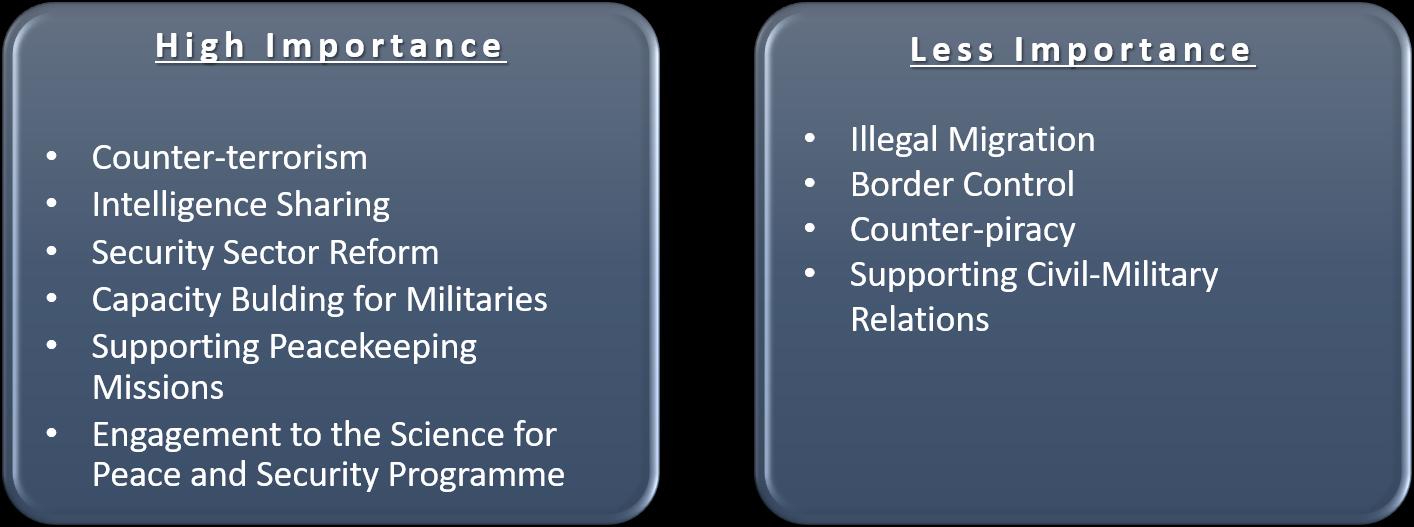
3 minute read
5. Recommendations for NATO
A comparison of the Southern Hub missions and African expectations from NATO, however, produces a closer match. The Southern Hub missions are understanding the continent, supporting Africans, coordinating NATO activities and reaching out to African actors. On the other hand, the expectations of Africa begin with receiving support without interference in internal affairs. This is deeply connected with the number one mission of the Southern Hub, to understand the South. Actually, Africa does not expect significantly greater NATO involvement in the future; so NATO needs to understand its limits before it even begins to act in Africa.
Greater clarity on NATO strategic aims could be another issue for NATO staff in Brussels, in Norfolk, in Naples and all the HQs of NATO across the transatlantic region. African demands for support to the military sector, peacekeeping, conflict resolution, training and so on, also match with the coordination mission of the Hub. The demand for a platform for NATO/Africa relations is undoubtedly a major factor in justifying the necessity of the Southern Hub. One could easily claim that the foundation of the Southern Hub has a just basis and the execution of its activities will be so crucial that NATO cannot countenance failure of any kind there.
5. Recommendations for NATO
African and NATO security interests are closely interlinked. Instability in parts of the continent has been identified as one of the causes of irregular migration, especially to Europe, while terrorist organizations directly threaten the security of NATO member states.
The security threat perceptions as well as priorities of the continent and NATO are not matching each other, though. The prime security problems of Africa are a source of concern for the continent, whereas NATO is concerned with the wider repercussions of such security problems, including border control, migration, or piracy as opposed to ethnic conflicts, corruption, poverty and so on. However, there is a room "to melt them all in a pot" since they are linked. NATO should move African threat perceptions to the top of its list and prefer to resolve its own primary perceived threats using an indirect approach, because the elimination of the primary threats in Africa may indirectly solve the primary threats for NATO.
The African conceptualization of security is also different to NATO's, and it is not a classical one focused only on the military sector. Instead, African understanding is based principally on human security. Hence, NATO should view security in the broadest sense possible, including political, military, economic, societal, environmental, and other elements. This change of understanding of security in NATO seems necessary for a productive relationship with Africa in the future.
NATO should also maintain a position of strategic partnership and cooperate with the African Peace and Security Architecture (APSA) in addressing continental and external threats to security. NATO can become a strategic partner for developing nations' security forces through training, mentoring and exchanges, and should also focus on 'Building Integrity' (anti-corruption). This approach should lead to a clear NATO strategy towards the South, and which becomes, in turn, a clear desire on the part of the continent.
The African demand for a platform for the NATO and African relations undoubtedly matches the concept of the Southern Hub. One would easily claim the foundation of the Southern Hub has,
therefore, found a just cause, but this also means that the effective execution of its activities will be critical.
During the last decade, the experiences in Libya have had a negative impact on the perception of NATO in Africa. Rebuilding lost trust will constitute an important first step, before developing an effective relationship with Africa. Russia and China are not the only rivals for NATO on the continent: but they both also present some lessons about how to act on the continent in terms of gaining and regaining trust and confidence.
NATO also needs an expanded presence in Africa with clearly defined goals in the short term to further build trust. However, NATO should view its engagement primarily in the long-term, not episodically, and it should engage regionally primarily through the African Union. If it acts in that way, NATO will gain more trust and legitimacy on the African continent, to the ultimate benefit of both.
Overall, the main objective of NATO in Africa should be contributing to the creation of the necessary conditions in order to foster security and development across the African continent.






